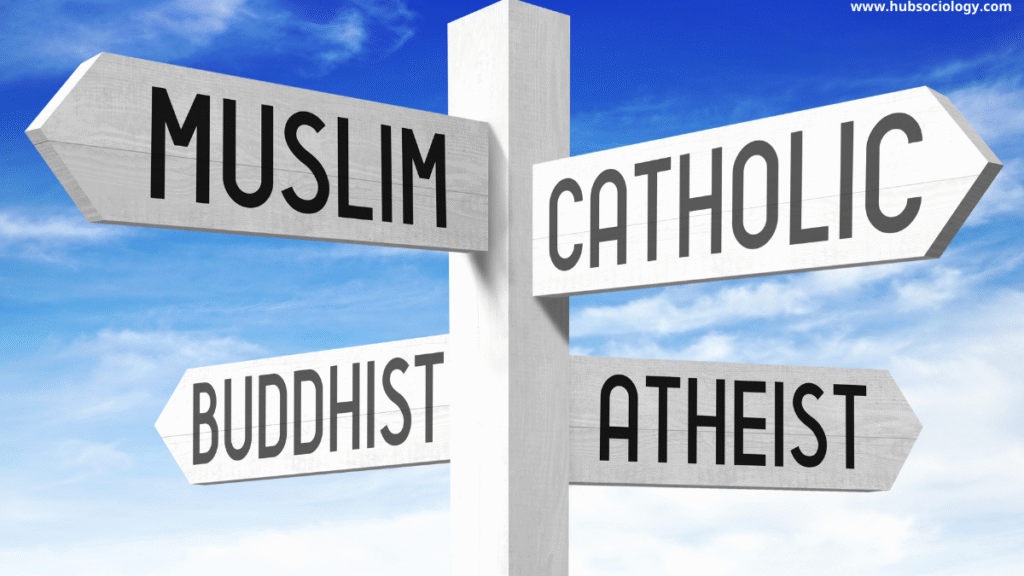Introduction
Religion has long been central to sociology, not as a matter of divine truth but as a social institution that influences human behavior, relationships, and culture. The functional approach to the study of religion examines religion in terms of the roles it performs for individuals and society rather than its theological content.
This approach highlights religion’s functions—such as social cohesion, meaning, order, and cultural continuity—while also recognizing its limits. The following sections explore the origins, key contributors, features, critiques, and contemporary relevance of the functional approach in sociological study.

Origins of the Functional Approach
The roots of the functional approach lie in the work of Émile Durkheim, who argued in The Elementary Forms of Religious Life (1912) that religion is essentially society worshipping itself. Durkheim emphasized that religion unites individuals into a moral community, reinforcing social solidarity.
Later scholars like Bronisław Malinowski, Talcott Parsons, and Robert K. Merton expanded the perspective, exploring religion’s psychological, systemic, and latent functions.
Key Features of the Functional Approach
Instead of asking whether religious beliefs are “true,” the functionalist perspective asks what religion does for society and individuals.
1. Social Cohesion
Religion strengthens group unity through shared rituals and practices. Festivals, pilgrimages, and prayers bring communities together, reinforcing solidarity.
2. Meaning and Purpose
Religion addresses fundamental human questions about life, death, suffering, and morality, offering individuals comfort and direction.
3. Social Control
By prescribing moral codes, religion regulates behavior, discouraging deviance, and encouraging conformity.
4. Cultural Transmission
Religious myths, values, and traditions are passed from one generation to another, ensuring cultural continuity.
5. Conflict Management
Religious rituals and symbols help societies cope with crises, disasters, and tensions, reducing instability.
Émile Durkheim: Religion and Social Solidarity
Durkheim’s functionalism emphasized collective conscience—shared beliefs that hold society together. Religious rituals, like totem worship in tribal societies, reinforce moral unity.
For Durkheim, the sacred represents society itself, while rituals renew the sense of belonging. Modern equivalents include national ceremonies or sporting events, which function similarly to religious gatherings.

Bronisław Malinowski: Religion and Psychological Needs
Anthropologist Malinowski highlighted the psychological function of religion. His Trobriand Islands study showed that rituals were performed during dangerous sea voyages but not during safe lagoon fishing.
This indicates that religion helps individuals manage anxiety, uncertainty, and fear in unpredictable situations, offering emotional security.
Talcott Parsons: Religion and Social Systems
For Talcott Parsons, religion legitimizes social norms and values, ensuring system stability. By aligning personal goals with collective values, religion supports order and integration.
Christian work ethics in Western societies, for example, provided meaning that reinforced economic systems like capitalism.
Robert K. Merton: Manifest and Latent Functions
Robert Merton refined functionalism by distinguishing between:
- Manifest functions: intended goals (spiritual guidance, moral teaching).
- Latent functions: hidden effects (building networks, legitimizing power, reinforcing hierarchies).
This perspective reveals how religion influences society in ways beyond its stated purposes.
Criticisms of the Functional Approach
Despite its insights, the functional approach faces criticism:
- Overemphasis on consensus – It overlooks how religion creates division, such as sectarianism or communal conflicts.
- Neglect of power relations – Marxists argue religion often justifies inequality, e.g., caste hierarchies or divine monarchy.
- Secularization – In modern societies, religion’s role is weakened by education, science, and media.
- Pluralism – Functionalism assumes shared values, but diverse religions can lead to competing norms.
Relevance in Contemporary Society
Despite critiques, the functional approach remains highly relevant in analyzing religion’s modern role:
- Identity Formation: Religion shapes cultural and community identity, especially in multicultural societies.
- Conflict and Peacebuilding: Religious leaders often mediate conflicts and promote interfaith harmony.
- Social Services: Religious institutions provide education, healthcare, and welfare where states are weak.
- Cultural Continuity: Festivals and rituals preserve traditions, even in secular societies.
- Global Issues: Religious movements address climate change, migration, and human rights, offering moral frameworks.
Thus, religion continues to function as a meaning-giving, unifying, and service-oriented institution, even in secular and globalized contexts.
Conclusion
The functional approach to the study of religion demonstrates how religion integrates individuals, maintains order, provides meaning, and sustains culture. From Durkheim’s theory of solidarity to Malinowski’s psychological comfort, Parsons’ systemic stability, and Merton’s latent functions, this approach highlights religion’s multi-dimensional role in society.

While criticized for ignoring conflict and power, functionalism remains valuable in contemporary analysis. By focusing on what religion does, it reveals the enduring significance of religion in shaping identity, belonging, and social order in both traditional and modern contexts.
Do you like this this Article ? You Can follow as on :-
Facebook – https://www.facebook.com/hubsociology
Whatsapp Channel – https://whatsapp.com/channel/0029Vb6D8vGKWEKpJpu5QP0O
Gmail – hubsociology@gmail.com
Topic-related questions
5 Marks Questions
- Define the functional approach to the study of religion.
- What is the main contribution of Émile Durkheim to the functionalist study of religion?
- Mention two psychological functions of religion according to Malinowski.
- Differentiate between manifest and latent functions of religion as given by Robert K. Merton.
- How does religion contribute to cultural transmission?
10 Marks Questions
- Discuss how religion acts as an agent of social cohesion in society.
- Explain the role of religion in providing meaning and purpose to individual life.
- How does Talcott Parsons view religion as a stabilizing force in social systems?
- Critically analyze the limitations of the functional approach to the study of religion.
- Examine the contemporary relevance of the functional approach to the study of religion in a globalized world.
15 Marks Questions
- Evaluate the contributions of Durkheim, Malinowski, Parsons, and Merton in developing the functionalist perspective on religion.
- “Religion is not what it is, but what it does.” Discuss this statement in the light of the functional approach.
- Analyze the role of religion in both maintaining social solidarity and generating conflict, with suitable sociological examples.
- Critically examine the functional approach to religion and its applicability in secular and pluralistic societies.
- Discuss the sociological significance of the functional approach in understanding the changing role of religion in modern society.
